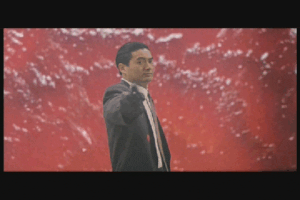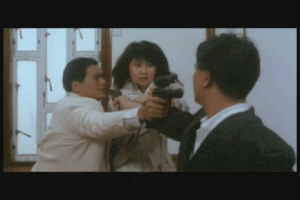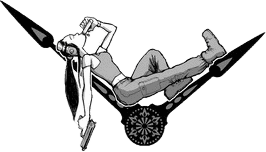
The Killer (Die xue shuang xiong) 1989
Directed by John Woo
Starring Chow Yun-Fat, Danny Lee, Sally Yeh, Kong Chu, and Kenneth Tsang.
The Plot:
Chow Yun-Fat’s ultra cool hitman accidentally blinds Sally Yeh’s nightclub singer after saving her life. Honour bound to protect her he agrees to one final job in order to raise the money she needs for an eye-operation in the states. Double crossed by his friend and those that hired him, the killer’s path crosses that of a cop played by Danny Lee. As the cop and killer come to respect each other, the singer falls for her protector as a small army of assassins close in on the trio. The ‘action movie’ but so much more – spectacular both in vision and style with an ending that punches you in the gut, The Killer has to be seen to be believed. Directed by John Woo who is now firmly entrenched in Hollywood after the success of Face/Off and Mission: Impossible 2
(If you haven’t yet seen the movie be warned that the following includes spoilers )
The Movie:
The Killer is renowned for its style as an action movie – blood, mayhem and bullets fill the screen. The original Cantonese title of Die xue shuang xiong translates as A Pair of Blood Splattering Heroes. Not a subtle title by any means but The Killer can be a very subtle movie as well as a daring one. John Woo kick-started the Hong Kong genre of ‘Heroic Bloodshed’ off a few years earlier with the devastating A Better Tomorrow also starring Chow Yun-Fat, his favourite actor. ‘Heroic Bloodshed’ is a genre that has found many fans in the west and its influence on Hollywood and has been interesting if not altogether successful. The Replacement Killers for example, was little more than an action vehicle built to introduce Chow Yun Fat to a wider audience but while director, Antoine Fuqua, could pull off the stylish action scenes reminiscent of Woo or Ringo Lam what he could not tap into was the heart of heroic bloodshed – there is more going on here than simply balletic action set pieces (the kind of which The Matrix turns into an artform).

The main storyline of Yun-Fat attempting to right the wrong he has done Sally Yeh’s nightclub singer is not as significant as that of his own struggle to find a place in the modern world. The character of the killer, Jeffrey is one built around an old fashioned code of morals and values. The only people to recognise this ironically are his friend/mentor who betrays him and the cop whose job it is to bring him down. This needs looking into but first a few words on the translation of the movie.
Western audiences have never been comfortable with the naming of Yun-Fat’s killer as Jeffrey, to the extent that when Criterion retranslated the movie for laserdisc they renamed the lead character from Jeff to ‘John’. John in seems is a more ‘action friendly’ name for a leading man – John McClane in the DieHard trilogy springs immediately to mind. Woo seems to rub salt in the wound by naming Jeff’s friend, Sidney. You can hear the sniggering right now can’t you. But for Criterion and others to assume that these names were picked at random by the original subtitlers is naïve and for Criterion then to ‘rectify this mistake’ not only shows an air of superiority not in line with Criterion’s other discs but a genuine misunderstanding of the film on their part. If The Killer owes anything in its origin to any other movie then it is Jean-Pierre Melville’s 1967 gangster classic Le Samourai in which Alain Delon plays a killer for hire betrayed by his employers. Delon’s character’s name is Jef Costello. Woo intended for his ‘killer’ to be named Jeff as a direct reference to one of his favourite and most inspirational movies. If then a western audience find that amusing then that’s their loss. Idiots. Ironically we never learn ‘Jeff’s real name in the movie as he not once ever reveals it.
For the remainder of this piece I have chosen to refer to characters by their more ‘proper’ translated names i.e. Sidney as opposed to Sydney, Li instead of Lee and so on.
There is yet another problem with the translation of names in the movie depending on which version you are viewing. The cop, Li, and the killer, Jeff, use nicknames for each other throughout the latter part of the movie. In most European versions of the movie these appear as ‘Dumbo’ and ‘Mickey Mouse’ but in most American prints you will find they translate as ‘Numb-nuts’ and ‘Butt-head’. Sigh. The original Cantonese nicknames were “Ah-b” for Danny Lee’s character meaning ‘Little Brother’ showing not only the fondness that Jeff has for the police man but also shows a hierarchy that becomes more established as the movie develops – even in the final shoot-out in the church Li is still acting like a cop, begging Jeff to give up his guns, while it is Jeff who recognises the reality of their situation all too well; “Get out there and tell them you’re a cop, see if they give up the guns.” While Li’s nickname for the killer “Xiatou” translates as ‘Shrimphead’ showing his more juvenile standing and sense of humour. Its also worth noting that these nicknames are created on the spur of the moment by Li to back up Jeff’s story to Jennie that the two men (who, unknown to her, are holding guns on each other) are old friends who grew up together. Therefore it is Li who christens himself ‘Little Brother’ and Jeff ‘Shrimphead’ in order to score a few points over the killer, who by this point he has more than a grudging respect for.
OK back to the main theme of the piece; Honour. Look at the relationship between Jeff and Sidney – Jeff still considers him his best friend even after the initial betrayal. Jeff laments how things have changed, “Our world is changing so fast… perhaps we are too nostalgic.” To which Sidney replies “Nostalgia is one of our saving graces.” He goes on to suggest that they settle their differences in the next life but Jeff offers to wipe the slate clan immediately – “That’s what friends are for. Right?” Friendship holds the whole movie together. Sidney ultimately dies trying to regain the honour he lost when he betrayed Jeff . Chan dies causing a series of flashbacks for Li revealing how Chan had nurtured the younger cop, Li must now avenge his friend’s death, yet most significantly, when he realises the cause that Jeff is fighting for, he recognises that the killer’s sense of honour is greater than that of his superiors. Jeff must follow his course oblivious to the law that Li had sworn to uphold.
There is also the glimpse of a ‘normal life’ to be had with Jennie. Leave the underworld behind and escape to America – start again. As in most of these movies (A Moment of Romance, People’s Hero etc.) escaping the past, although something to fight for, is never really an option.

That Jennie’s story is so tragic is only part of the tragedy that the film unfolds; by the film’s close Jeff realises he has the power to save her eyesight and gladly accepts death as the cost, first asking Li to do what is necessary after he is gone. Jeff loses that chance of redemption for both Jennie and himself – he dies crawling blindly through the mud and Jennie, now beyond help herself, never finds his body. Li unable to carry out his friend’s dying wish instead takes on his persona – becoming vengeance and finally resolving Jeff’s task by killing his enemy – even though that enemy had by then given himself up. The film ends with Li surrounded by his fellow officers, himself now the ‘‘killer’’ of the title.
That such a bleak ending succeeds is remarkable but succeed it does. Try reading the Walter Hill version of the dreaded Hollywood remake script where everyone lives happily everafter. Shudder. The ending of the film brings to a close the duality of the two protagonists. They ‘merge’ into one entity by the film’s climax and although this is an ongoing process for both of them it reaches its turning point when Li realises he cannot stand in the way of what Jeff is attempting to do – this revelatory scene is when Jennie pulls the trigger of a gun that she believes is pointing at Li’s head – her love for Jeff forces Li to confront his own moral code.
I remember first seeing this move years ago and how numb I felt at the film’s close. Now after numerous viewings the ending still gets to me, Woo refuses his audience even the concession of allowing the blinded lovers to find one another before Jeff dies, as it stands Jeff dies alone and with him all hope for Jennie’s future happiness. In theory Li could have picked up Jeff’s mantle in another way and stood as Jennie’s protector but instead he has no choice but to avenge his friend’s death in much the same manner that Jeff could not simply give up after Sidney’s death. Li’s future is as bleak as Jennie’s – already looked down upon as a maverick by his superiors it is doubtful that his career will continue after his ‘killing’ of a man in custody – in fact a prison sentence probably awaits him. It seems that all the characters are doomed from the beginning of the movie, trapped as they are in a nostalgic world and this includes Jennie whose songs are at odds with her surroundings i.e. the club she is singing in – nothing more than a front for a mobster – and later her lyrics take on a terrible meaning as sings of the pointlessness of planning for a future, “who needs tomorrow when we have today” seems to be the melancholy theme of her own world as she warns Jeff even before they had met not to make promises that he would be unable to keep.

Lowell Lo’s music is beautifully understated, the motif of the harmonica running throughout the movie is used to starting effect especially at the film’s close as the credits roll and we recall an earlier scene of Jeff playing the tune out of his window in view of the church. The religious imagery is definitely there but there is a danger to read too much into it, especially if you know a little of Woo’s own past, but as it stands it works beautifully. Chow Yun-Fat sitting amidst a thousand candles at the beginning of the movie, the statue of the Virgin Mary which is later blown to bits, the slow motion doves which Woo himself reprises later in both the excellent Face/Off and the dire Mission: Impossible 2. As moving as some of the images are the church is shown to be an inadequate refuge and the priest along with most of the cast ends up dead. No redemption here.
The film is crammed with Woo’s trademark imagery, slow-motion pieces and flashback sections. Standout moments are Jennie recalling the face of the killer for Li allowing Woo to flood the background with blood just at the instant that Jeff fires his gun, and later when Jeff has finally been driven too far after Stanley’s death; he stands in slow-motion pulling off his black tie with one hand only to refasten it about his arm as a sign of respect for his friend. As in most of Woo’s movies its the small moments that stay with you, for example when Jennie reaches out to a candle flame and finally realises the extent of her blindness.
Despite all this there is still the whole grandeur of the movie to take in – the action scenes are over the top and balletic, in fact the movie itself has a very operatic feel about it. The IMDB has the bodycount down to 120 which is excessive to say the least, and its never a good idea to be cast in white on a John Woo movie.
Much has been made of the homo-erotic elements of the movie. The onscreen charisma between Danny Lee and Chow Yun Fat is remarkable and yes they do have a habit of holding guns on one another. The character of Sidney can be seen also to be quite camp to western viewers but then again you have to relate this to how homosexuals are often portrayed in HK action films. Take Pantyhose Hero for example, also known as Pantyhose Killer, the plot revolves around two cops, Samo Hung and Alan Tam, who go undercover in a gay subculture in order to track down a serial killer, helped to fit in by a female officer who teaches then how to be feminine. Hardly PC. Then there is the outrageously camp / sadist figure of Judge (Simon Yam) in Full Contact. If the characters in The Killer are intended to be homosexual then they are very restrained by HK standards. There is not one single instance that is as suggestive as say the scene in In The Line of Fire when Malkovich ‘swallows’ Eastwood’s ‘piece’ and yet that movie is not referred to as homoerotic. Yes, there is an attraction between the two men but it goes somewhat deeper than a flirtation and seems to be more grounded in their mutual respect for each other as ‘brothers’ rather than potential lovers.

Historically, The Killer did a great deal in opening up Hong Kong action cinema to a western audience, it put Chow Yun Fat on his way to superstar status and emphasised the reputations of both director Woo and producer Tsui Hark. No one really knew what could come after The Killer in means of characterisation, style and action quota; three years later Hard Boiled was released.
Note:
The term ‘Heroic Bloodshed’ was coined by Rick Baker in the late eighties but elements of the genre can be seen in earlier movies than A Better Tomorrow, a good example being Kirk Wong’s The Club (1980). See also the documentary Cinema of Vengeance (1993) directed by Toby Russell for an introduction to the genre’s past and HK film making in general.
All quotes and images are taken from the 1993 Universe Laser & Video Co. Ltd. multi-region DVD release of Die xue shuang xiong.
